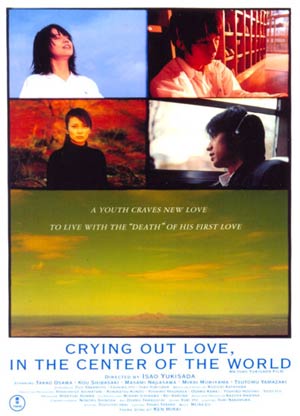When you die, does love die, too? That's the question at the very heart of Crying Out Love, in the Center of the World, the 2004 box office sensation directed by Go's Isao Yukisada. Based on the best-selling romance by Kyoichi Katayama, the film stars Takao Osawa (Sky High) as Sakutaro Matsumoto, a brooding thirtysomething male engaged to the beautiful Ritsuko Fujimura (Kou Shibasaki from One Missed Call). But the seeming normalcy of this happy couple's life is interrupted by an incident straight out of Haruki Murakami's best work. While packing up boxes for a move, Sakutaro's fiancée discovers a cassette tape. After searching the local stores for a Walkman capable of playing the now obsolete technology, she finally listens to the cassette and hears a young girl's voice. Moved to tears by the tape's content, Ritsuko promptly walks out of Sakutaro's life, leaving him with only a cryptic note: "I'm going away for awhile. Don't worry about me."
Confused and unsure of himself, Sakutaro heads to a bar to think things over. By pure chance, he receives an important clue to Ritsuko's whereabouts. While watching a live television report at the Takamatsu Airport during an impending typhoon, he sees his fiancée hobbling around (plot point!) in the background. The location sparks Sakutaro's memory banks, plunging the man's thoughts backwards in time, some seventeen years ago. His current situation, it seems, has origins in the past.
The film then shifts perspective to 1986 with young "Saku" (now played by Mirai Moriyama) attending the funeral of his principal. During the ceremony, he becomes intrigued with the student chosen to give the eulogy: Aki Hirose (Masami Nagasawa), an intelligent "girl next door" type with a radiant smile and personality to match. Thanks to a seemingly chance encounter, Aki hitches a ride on Saku's motor scooter, and immediately, a relationship between the two soon blossoms. Not long after, the new couple decides to enter a late night radio contest to see who will be the first to hear their dedication played on the air. The prize? One brand new (for 1986 anyway) Sony Walkman offered by the radio station. The friendly contest soon turns sour when Saku's winning entry unintentionally offends Aki. Too upset to tell him why face-to-face, she explains her feelings via a cassette recording which she promptly hands over to an apologetic Saku. The two eventually decide to exchange tapes back and forth, telling each other stories, asking each other questions, and generally getting to know each other better in the face of their somewhat restrictive teenage circumstances.
The narrative intercuts between the past and the present as we then follow the elder Sakutaro returning to his hometown, visiting old haunts, and eventually finding the cassettes Aki left for him. But it seems that Sakutaro isn't the only one who has returned. Ritsuko, too, wanders the same areas as her fiancé. But to what purpose? That question is tabled until the film's final act, but in the meantime, the audience is treated to a refreshingly well-drawn teenage love story, albeit one that harbors a secret.
During their adventures, young Saku and Aki encounter Uncle Shige (Tsutomo Yamazaki), a relative of Saku's who runs the local photo studio. Through a series of events, they learn the story of Shige's long lost love, a woman he planned to marry, but didn't thanks the onset of war. But even after she married someone else, Uncle Shige admits that he's loved her from afar for all these years and continues to love her even in death. Now if one factors in the Romeo and Juliet references and the other general hints (if not out-and-out facts) the film drops, you're sure to figure out where this film is headed. Yep, you guessed it: Aki is sick. Real sick. I guess South Korea doesn't have a lock on the terminal illness tearjerker anymore.
In an attempt to brighten her spirits, Saku promises to take Aki to Uluru, which she calls the "center of the world," a sacred place she's seen only in photographs. But as she grows sicker, will they be able to make it? And in the present day, will Sakutaro be able to reunite with his fiancée? The answer to both questions, it seems, resides in the intersection between both timelines.


